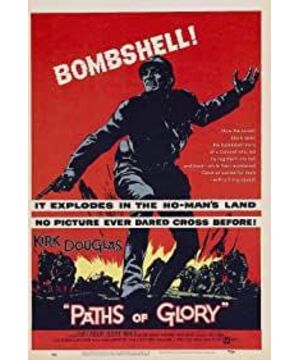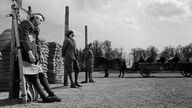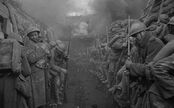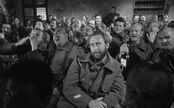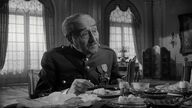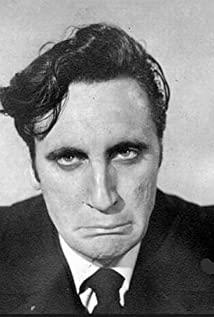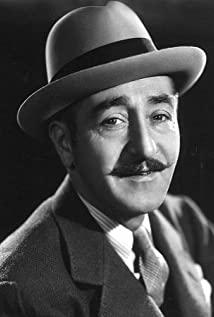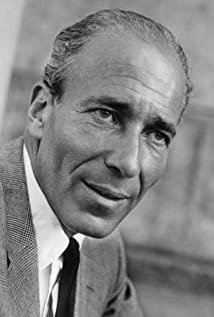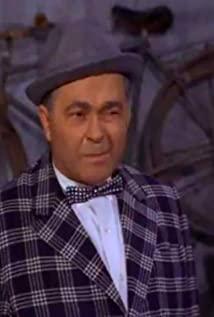The most important reason I love this film is that the film is straightforward, and its simplicity, whether it is suggestion or metaphor, directly shocks the entire dialogue of the characters. There is no nonsense. The dialogue of the characters is full of ironic themes.
The description of the three soldiers is also very comprehensive: an honest farmer, a petty-bourgeois angry youth who has been bewitched, and a sergeant who also has the quality of an officer. Fate has played the
most obvious symbol of the victim of the suicide failure. Kubrick's film. It is the symmetry of the space and the roundabout of the characters. In the film, the two generals paced repeatedly in the dialogue between the two generals. In particular, General Milo’s inconsistent arguments about the plan to attack the anthill. In the end, the soldiers accepted the movement of the suicide mission and the positions of the characters were back in the past. The satirical effect was achieved.
If I remember correctly, the United Kingdom also filmed a similar film and put the story on the Boer War team from Australia. The British reconnaissance unit composed of the volunteers massacred a group of surrendered Boers. Facing the condemnation of the world public opinion, the British army headquarters finally pushed these colonial soldiers as scapegoats to the court. The same officer who was a lawyer tried to defend them in the despicable. Colonial policy and conspiracy,
General Brullard is the one who always manipulates the entire incident in this play. This old fox started to encourage General Milo to attack the anthill and then retreated behind the scenes after the attack failed. The conflict between Miró and Dax finally took a punctual opportunity to use Daxburn to save the three soldiers. The evidence that Miró had ordered the shelling of his own troops excluded the Milo
soldiers. They also had this duality: on the one hand, they were to be slaughtered. The Lambs sacrificed for nothing in a battle that must be fruitless. On the other hand, they did not have the slightest consciousness. In the intermission of the battle, they did all kinds of tricks on the captured girls who were the same as their fate, and exposed the despicable weakness of human nature.
The final tragedy of the film is that the evidence that Colonel Dax used to threaten the general to give up the death penalty was used by General George as a means to exclude dissidents.
Colonel Dax was also given limitations: when he was told that he led the troops to attack the impossible ants. Yau knew that such a tragedy was inevitable, but he was still forced to accept orders. Just as the old treacherous general George who controlled everything behind the scenes pointed out that if he really wanted to save the soldiers, he could have refused to order
Colonel Dax in the first place. In the end, knowing that he could not save them, he also played a trick: let Captain Roger, who persecuted Sergeant Baris, act as the execution officer, knowing that he deliberately chose Baris as a scapegoat because of his timidity in performing the mission and the death of his comrades. Roger personally experienced the feeling that the crime cannot be cleansed for life
. The description of the soldiers after the sentence is the most desperate in the play. No one can save them. No matter the past comrades in arms, Colonel Dax or the penitent priest, they can only hold their heads up or hold their heads up. Dying or crying towards the execution ground.
This is probably the benefit of black-and-white film, especially anti-war theme film. I really can’t imagine if this film is remade into color film, whether it will weaken the dark theme of the film. The same black-and-white film handles the lens. It is also far simpler.
Another ironic thing is that the adjutant who had served as a prosecutor on the execution ground was obviously not confident enough when he read the death sentence and his arrogant arrogance when he was the prosecutor. In the name of the French people', he took a breath.
At the end of this film, Kubrick did not add the desperate ending of the complete annihilation of humanity in the past. At least through the carnival of soldiers and the helpless captured German girl’s singing, the annihilated humanity still has a certain degree of humanity. Affirmation and sustenance Of course, there is also an apology from the lieutenant on the execution ground to the soldier who was framed by him.
View more about Paths of Glory reviews


